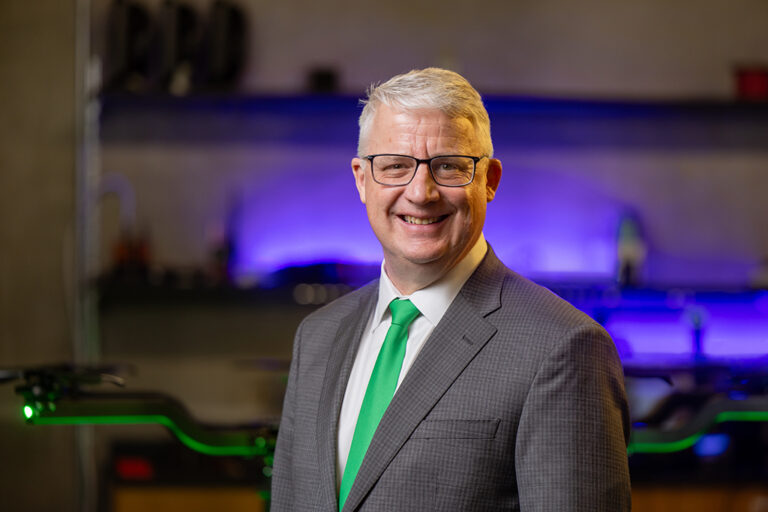Research offers tips on job hunting in academia
New paper co-authored by UND researcher provides insight on job search process

Is there a better way to match postdoctoral job applicants with positions in academia?
Amanda Haage thinks so. She’s an assistant professor of biomedical sciences in the UND School of Medicine & Health Sciences who went through the job-hunting process herself before accepting a position at the University early this year. Based on a survey of more than 300 postdocs, she has data showing why it’s important to improve the process.
Haage said a more transparent process would not only benefit postdocs applying for jobs, but also the search committees trying to match candidates with the positions they’re filling.
“Not everyone’s going to be happy with their job search,” she said. “But I think we could aim for the level of making it so we didn’t feel completely defeated, stressed out and anxious by the end.”
“Insights from a survey-based analysis of the academic job market” was published this week on bioRxIV, a preprint server for biology research. Haage, one of the paper’s co-authors, collaborated on the project with 10 other postdocs whom she’s never met in person. Their common interest in finding jobs in academia brought them together online through Future PI Slack, an informal peer mentoring group for biomedical postdocs searching for jobs in academia.
Self-help for postdocs
“The whole point of creating our group was that no one really knew what they were doing,” Haage explained. “It really helped, but what would be more helpful is knowing what benchmarks we’re up against when trying to find a professor job. Is my CV (curriculum vitae) good enough, or am I even qualified for the job? How do I actually get that job?
“A group of us got together and created a survey to really try to get at the transparency of this issue, to give people benchmarks, to be able to plan their career and to see what actually matters,” she added.

Haage, an Iowa native, received her Ph.D. from Iowa State University and did her postdoctoral work at the University of British Columbia in Canada. At UND, she’s teaching anatomy with an emphasis on active learning and evidence-based teaching practices. In the lab, her research focuses on cancer metastasis – specifically pancreatic cancer – and how the environment surrounding cells influences their ability to move and migrate through the body.
UND Today met with Haage to discuss the paper on the academic job market and the findings of the survey on which it’s based.
What makes the process of applying for an academic job so stressful?
To look at the way postdocs perceive the process, we had an open-ended question that people could answer on what they thought of the process. Not all 300 answered this question, but of those who did, not one person answered that they were positive or happy with this process. Not a single one. It’s highly stressful. People feel like it’s not fair. They feel like they don’t know what they’re doing. All these things are subjective, but, again, our pool had a 60 percent success rate. They’re highly qualified and they got jobs, but they still didn’t like the process. They felt like it was stressful and harmful to a certain degree.
Why is it important for the academic job application process to be improved?
We’re producing far more Ph.D.s than we have academic positions for. The number of faculty hasn’t increased since 2003 with the last large NIH (National Institutes of Health) funding increase. But the number of Ph.D.s we’re producing are steadily going up. Schools are getting over 200 applications for each faculty-level job.
What helps increase the success rate of getting a job?
The number of applications people submitted had a huge effect on whether someone received an academic job offer. If you sent in more than 15 applications, you were more likely to get an offer. Submitting job applications is a very time-consuming task for postdocs. They’re spending more than three hours per position just to tailor their documents – such as changing cover letters to be more specific to a university – and that’s not even counting the original creation of materials. We found the median for our entire group was one job offer. Everyone is pretty much relocating their entire lives from their postdoc based on one academic job offer. We’re going where we get the offer because we’re getting only one.

How much does having a paper published in a major scientific journal help?
We looked at whether having a paper published in Cell, Nature or Science – those big publications that have the highest impact scores – affects your ability to get a job. We found it’s not necessary to get an academic position. In our group of around 300 people, 60 percent of them got a job, but few of them had a paper published in one of those journals. So it’s not it’s not required, but it does help.
What would a university search committee find useful in your paper?
We did a small-scale survey of about 15 search committees. What we’re hoping to see is increased transparency in job ads. The descriptions of what the search committee values often don’t make it into the job ad, and the applicants aren’t receiving feedback. The amount of rejection letters we got was around 10 percent of the applications we put in. Few are even told that they didn’t get the job, let alone why they didn’t get the job.
We want to promote better job ads that are more transparent and providing feedback to at least some of the applicants. We think it would really help change the process for the better. It would help postdocs feel like they could improve their applications.
Having gone through this process and seeing the data from your survey, what would be your advice to a postdoc applying for an academic position?
Don’t disqualify yourself from anything. Nobody has the CV to make them the perfect candidate for a new job. What we’re really seeing with the data is that there are multiple paths to an academic position. There are little tweaks you can do, like looking at your application number and deciding how much time you’re willing to put into it. We want to bring a sense of community to it as well. It’s stressful for everyone. Seeking out that community support and care are some of the best things you can do for yourself. You don’t have to do it alone. By participating together, we can make the process better.



